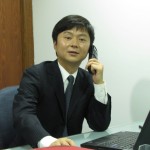 Flying into Beijing was like flying into a wet smokestack; the air was thick with gloom and rain. Breaking through layers of beige clouds, the ground below extended for miles – make that kilometers – in a brown expanse fragmented by drab buildings and rectangles of green water. Closer to the airport, and closer to ground, I saw high rises and enough landscaping to brighten my mood. I would be in Beijing for eight days on a lecture tour at Beijing Central Music Conservatory and the Beijing Dance Academy. And, if I could manage it, I would knock out a story to keep my Flagstaff Business News editor happy. My connection with the music and dance schools made it easy to track down a local entrepreneur.
Flying into Beijing was like flying into a wet smokestack; the air was thick with gloom and rain. Breaking through layers of beige clouds, the ground below extended for miles – make that kilometers – in a brown expanse fragmented by drab buildings and rectangles of green water. Closer to the airport, and closer to ground, I saw high rises and enough landscaping to brighten my mood. I would be in Beijing for eight days on a lecture tour at Beijing Central Music Conservatory and the Beijing Dance Academy. And, if I could manage it, I would knock out a story to keep my Flagstaff Business News editor happy. My connection with the music and dance schools made it easy to track down a local entrepreneur.
He Cui (pronounced Hay Tswee) is a rags- to-riches kind of guy. As a student, he was big on ideas and short on money, but he saw an opportunity, took a chance, and it paid off. It’s the kind of story that makes a country great. In this case, the country is China.
Like many Chinese, He Cui prefers to use an American name – in his case, Mark. Mark is the owner of Tian-Tian Art, or Everyday Art, founded in 1997. Back then, he was a music student at the Beijing Central Conservatory. As a student, he confronted a common problem. Music students needed music but “it was difficult to find music to buy,” he said. “There weren’t any stores and not much sheet music was available.” That’s when he got his big idea. “I had no money to start my first business,” Mark said. “So, I just did it. But my business developed very fast.” It developed fast enough, in fact, that he decided to expand. Today, Tian-Tian Art has three offices in Beijing and distributes sheet music, CDs, and DVDs throughout China. “I have thirteen stores under my direction and 400-500 retailers that I sell to wholesale.” But that’s not all. The 41-year-old entrepreneur has other ideas, too. He aims to take over the music teaching and testing industry in the country.
Affluent Chinese parents are willing to pay big money for private music lessons and proficiency exams to provide concrete proof of their child’s talent. “I’ve done a lot of research and testing of the market,” Mark said.
Entrepreneurs like Mark have benefitted from new freedoms in China over the past several decades and an increased openness to Western ways. “From my point of view,” said Mark, “between 1997 to 2007, China has had more and more opportunity with dramatic changes in the business environment, but in the past three years, I am facing more difficulties in doing business.”
You’ll never guess why… the Government.
According to Mark, the market and economy have gone backwards because of government intervention. Sound familiar? “That is a very dangerous situation for the economy. The government doesn’t care about the people. They talk like they care, but they really don’t,” he said.
Back in Flagstaff, I find a similar story. “We pay our taxes and customers can use the streets,” said Martha Garner when I asked her how much help she gets from the United States government. Garner is co-owner, with Ivan Ochsner, of Cedar Music. Like her Chinese counterpart, Garner is a university-trained musician; she’s a French Horn player and conductor. Ochsner is a bassoonist. They opened their store on South Milton sixteen years ago just as Internet sales began to take off. “At the time, there was no place to buy music in town,” she said. “We used to joke by saying, ‘well when WE open OUR music store…’”
Today, much of their business is online. “I’d say there was a surge in online sales beginning about eight to 10 years ago, when people started to have more confidence in online sales.” FRI
A tale of two cities and a couple of music stores. We’re a lot more alike than we might think. FBN







